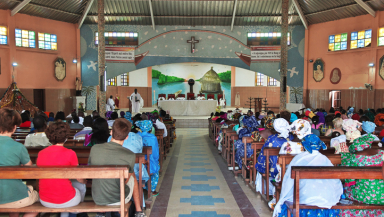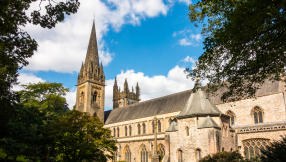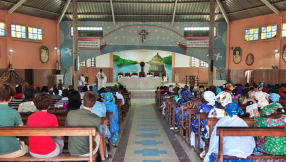
A leading church historian has warned that the public image of evangelicals is being distorted by US politics, even as the movement experiences rapid growth and renewed vitality across the Global South.
In a wide-ranging conversation on the Evangelical 360 podcast, host Brian Stiller spoke with Austrian scholar and church leader Frank Hinkelmann about the history and future of the World Evangelical Alliance (WEA) and the one-quarter of the world’s Christians who identify with evangelical faith.
Dr Hinkelmann traced the word ‘evangelical’ back to the Reformation, when the German term evangelisch was used to describe Protestants shaped by four central convictions: the authority of the Bible, the centrality of Christ’s atoning death, personal conversion, and active faith.
Over time, he explained, evangelicalism became “transnational,” “interconfessional,” and “interdenominational.
Revival movements emerged in various traditions, often cooperating with mission societies, Bible societies and evangelistic campaigns.
That shared conviction led to the formation of the World Evangelical Alliance in London in 1846, initially a fellowship of individuals who held leadership roles within their various agencies and denominations, rather than denominations.
One of its early priorities, Dr Hinkelmann noted, was to resist emerging liberal theologies that questioned the Bible’s reliability and divinity as well as core Christian doctrines like the bodily resurrection of Jesus Christ.
At the same time, the Alliance quickly became known for defending religious liberty. It lobbied governments on behalf of Baptists, Methodists and other Free church believers barred from worship in parts of Europe, intervened for Armenian Christians in the Ottoman Empire, and even advocated for Swedish citizens who risked losing their nationality for converting from Lutheranism to Roman Catholicism.
Mr Stiller and Dr Hinkelmann highlighted the difficulty of putting precise numbers on the evangelical community. Depending on how strictly one defines the term, estimates range from 450 million to nearly a billion people. The WEA generally uses a working figure of around 650 million.
Whatever the exact number, the direction of travel is clear. In 1960, researchers identified about 90 million evangelicals worldwide. Since then, the centre of gravity has moved decisively away from Europe and North America.
“I think currently we speak of over 60 per cent of evangelicalism that is predominantly in Africa, Latin America and also in some countries in Asia,” Dr Hinkelmann said, noting projections that this share could rise to three-quarters by 2050.
Unlike some other religious communities, evangelical growth is driven not only by higher birth rates but also by conversion and discipleship, he added.
Migration is reshaping Europe’s churches as well. In Austria, Dr Hinkelmann pointed out, the largest evangelical denomination is now a Romanian Pentecostal group, outnumbering long-standing native evangelical bodies combined.
In Ireland, a Romanian Pentecostal congregation built a thousand-seat church that has drawn attention from national leaders in a historically Catholic country.
He pointed to Bible Society’s research in England which found that church attendance among 14 to 24 year olds has almost doubled in the last decade, with similar trends appearing in France.
New congregations are springing up even in war zones: one Salvation Army church in Kyiv where Dr Hinkelmann regularly preaches has just opened a larger building to accommodate growth.
Despite this expansion, Dr Hinkelmann expressed concern that American culture wars are dominating global perceptions of evangelicalism.
Looking back over the last two centuries, he argued that the current alignment of large segments of US evangelicalism with specific parties and political leaders “is quite a unique situation.”
Earlier Protestant history certainly included church–state entanglements, but many evangelical movements of the 18th and 19th centuries fought precisely for greater separation of church and state and for the religious freedom of minorities.
From his vantage point in Europe, Dr Hinkelmann said many believers are uneasy about attempts to bind evangelical identity to any national agenda — whether on the left or the right.
“I think many of us would strongly urge for clear separation between the church and also evangelicalism as such then, and a government,” he stated. “You have Christians in different parties.”
Ethical concerns, he suggested, must extend beyond a narrow set of social issues to include economic and political justice and the impact of national policies on other countries.
He also warned against responding to secular “cancel culture” with a mirror-image version from the Christian side, insisting that evangelicals should defend freedom of conscience for others as well as themselves.
He said: “I think we need to watch that we don't enforce our convictions and beliefs for which we should stand [ ... ] we shouldn't enforce them on other others either."
He said there were lessons from history, particularly the conflicts during the Reformation, and the treatment of the Anabaptists.
"If I enforce my personal convictions, I think we are on dangerous grounds and we see that throughout history," he said.
Mr Stiller noted that while US evangelicals may account for only a small fraction of the global movement, their historical influence in missions, publishing and education means that American debates inevitably reverberate worldwide.
He quoted the late pastor and author Tim Keller, who once asked why the rest of the world should have to abandon the word evangelical because of how it is used by roughly 10 per cent of its adherents.
Dr Hinkelmann, who has served both as chair of the European Evangelical Alliance and as a global vice-chair of the WEA’s International Council, described the Alliance as a bottom-up network rather than a centralised institution.
National alliances exist in more than 140 countries, often mirrored by regional bodies and local councils. That grassroots character gives the movement its vitality, he said, enabling believers to cooperate in mission, prayer and advocacy, and to speak up for persecuted Christians in difficult contexts.
In one Middle Eastern country, for example, evangelical leaders are working with the WEA to secure legal recognition for expatriate congregations drawn from many nations.
Yet the same structure also creates persistent financial and organisational challenges. Many national alliances struggle to fund their own work because churches and agencies naturally prioritise their internal budgets.
Donors often prefer to support visible projects rather than invisible global coordination, leaving international bodies under-resourced.
With a new secretary-general now in place, Dr Hinkelmann believes the WEA faces a critical task: building a leadership and governance model that serves its regions and national fellowships while enabling it to speak credibly on behalf of evangelicals worldwide.
Looking to the future, Dr Hinkelmann expressed optimism, especially about younger Christians.
He observes that many evangelicals in their 20s and 30s in Europe care less about denominational labels and more about finding congregations where they encounter solid teaching and genuine community.
That attitude, he suggested, could create new opportunities for cooperation through interdenominational or transdenominational networks.
For those sensing a call to serve beyond their own church or country, Dr Hinkelmann’s advice is simple: “For every young Christian, it's good to cross their own national boundaries to see the world is bigger …Christianity is bigger … to get to know people from other denominations … from other cultures.
“And I think as they do this, they get also a broader perspective of what God is doing globally. And I think that is a brilliant starting point and therefore I'm quite hopeful as we look into the future with a young generation growing up and taking our place.”
He shared that his own path began when, as a young theology graduate, he volunteered with his national alliance’s youth ministry, eventually moving into wider European and global roles.
Despite structural strains and political tensions, Dr Hinkelmann believes the evangelical story is ultimately one of hope: “How well are we doing and what do you see the future as it relates to global unity? I'm quite positive, you know, because I see God at move.”













